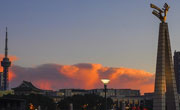S.Korea's deputy PM expects economy to rebound in Q3
SEOUL, Aug. 14 (Xinhua) -- South Korean Deputy Prime Minister and Minister of Economy and Finance Hong Nam-ki said Friday that his government expected the economy would rebound in the third quarter based on recent positive signs of economic recovery.
"It is possible enough (for the South Korean economy) to record a positive growth in the third quarter... The third-quarter result would be of great significance as it can determine the fourth-quarter outcome," Hong said in a press conference with foreign correspondents in Seoul.
"What matters is export... If export continues to become better than now, the economy would log a positive growth," said Hong.
The country's export slumped 7.0 percent in July from a year earlier, but the falling pace kept slowing from declines of 25.5 percent in April, 23.7 percent in May and 10.9 percent in June respectively.
Export to China, South Korea's biggest trading partner, grew for the second consecutive month through July, while shipment to the United States increased 7.7 percent in July after skidding 8.3 percent in June.
"Export to China accounts for about one-fourth of the combined (South) Korean export. It is meaningful (for South Korea) to post a positive export growth to China amidst the COVID-19 crisis," Hong noted.
China's gross domestic product (GDP) expanded 3.2 percent year on year in the second quarter, according to data from the National Bureau of Statistics (NBS). It was a sharp rebound from 6.8 percent contraction in the first quarter.
South Korea's real GDP diminished 2.9 percent in the second quarter from a year earlier, but it was far higher than other major economies.
The U.S. GDP retreated 9.5 percent in the April-June quarter, while those for Germany, France and Britain tumbled 11.7 percent, 19.0 percent and 21.7 percent each.
The Organization for Economic Cooperation and Development (OECD) said in its revised growth outlook earlier this week that the South Korean economy was forecast to fall 0.8 percent in 2020 under a scenario of no more COVID-19 pandemic in the country.
It was higher than the previous forecast of 1.2-percent contraction announced in June, marking the highest estimate among 37 member countries of OECD.
Credit card spending, which reflects private consumption, expanded for the third consecutive month to July thanks to the government's offer in May of relief grants to all households to prop up the lackluster consumer spending.
Hong said the government was "not considering" the second offer of government relief grants to all households as the private consumption was on a sound footing compared to investment and export.
The deputy prime minister noted that the country had much room for additional fiscal spending as it has a lower ratio of government debts to GDP than other countries.
According to the International Monetary Fund (IMF) estimate, the average ratio of government debts to GDP among Group of 20 (G20) economies was predicted to go up from 90.4 percent in 2019 to 111.2 percent in 2020.
The ratio for South Korea was forecast to rise from 39.8 percent to 43.5 percent in the same period.
The government announced almost 280 trillion won (240 billion U.S. dollars) worth of stimulus packages, including the third round of supplementary budget that was passed through the parliament in July, to bolster the economy.
The country's central bank lowered its target rate by 25 basis points to an all-time low of 0.50 percent in May, after slashing it by 50 basis points in March.
[ Editor: WPY ]










More From Guangming Online
Medics from Fujian leave for Shanghai to aid in battle against COVID-19 resurgence
New int'l land-sea transport service to Indo-China Peninsula launched
Another makeshift hospital under construction in Shanghai
Tourists view tulips in Suiping County, Henan
In pics: blooming gagea flowers on grassland in Zhaosu, Xinjiang
Greek workers stage 24-hour general strike over high prices